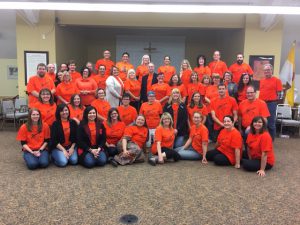We are in the last week of school before Christmas and I’m sure many are looking forward to a little rest and relaxation over the coming holidays. Let’s just begin with this… WELL DESERVED!!! For those who don’t live in the education world, it is easy to point fingers and tell us “how few hours we work” or “how many holidays we get” but we know the truth about looking after our students and each other day in and day out. It is what you are called to do and you do it so selflessly and always for those in most need. Thank you!
December is always a tough month as we lead up to a vacation but this one was just a little tougher. We had more tragedies than usual and serious ailments and illness consumed many. Sometimes people find it difficult to be as faithful when bad things happen to good people. Yet, when we are faced with these issues, we turn to God and offer prayers to those in need. We strive to build a community of hope and offer a spirit of joy even when we face difficult times. It is this blessing that I see in the schools I visit and the people I see. Thank you again!
This time next week, I’ll be anxiously awaiting the arrival of our grandchildren for Christmas. Donna and I will be hosting Christmas for the entire Smeaton side of the family for the first time here in Lethbridge. Usually, we head to Medicine Hat, but it just felt right this time to stay home and cherish the blessings of little ones and older ones. Carter will be three in January and so Christmas will be very exciting for him, while Emerson, at only 7 months, will just be intrigued with all of the lights! I can’t wait to hold these two little ones! 
For some, this marks the last Christmas vacation as an employee of Holy Spirit. There have been quite a number of staff who have taken advantage of the voluntary retirement program. I know this decision is not easy and so I can only wish you the best in your future and many thanks for your work. May this Christmas be extremely memorable!
Finally to all, I hope this Season of Advent was one of preparation, prayer and reflection. In just over a week, we will celebrate the birth of our Lord and Saviour, Jesus Christ. May the light of Christ guide all your travels and may the warmth of His love encompass you always.
On behalf of Donna and I, we wish each of you a most blessed Christmas and best wishes in 2019. God Bless!


